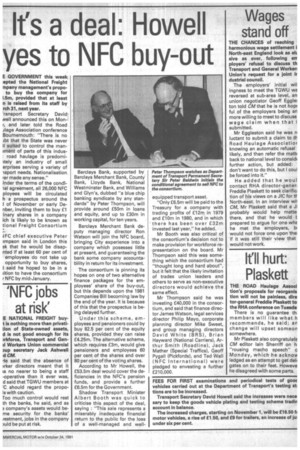Ifs a deal: Howell yes to NEC buy-out
Page 3

If you've noticed an error in this article please click here to report it so we can fix it.
E GOVERNMENT this weeki :epted the National Freight rnpany management's propoto buy the company for I.5m, provided that at least n is raised from its staff by rch 31, next year.
'ransport Secretary David r oven announced this on Mon-1 f, and later told the Road Jlage Association conference Bournemouth: "There is no „Ibt that the State was never II suited to control the maniment of parts of this indus, road haulage is predorniitely an industry of small erprises serving a variety of 'sport needs. Nationalisation, fer made any sense."
inder the terms of the condilel agreement, all 26,000 NFC ployees will be circulated h a prospectus around the i of November or early Denber, inviting them to buy £1 inary shares in a company ich is likely to be known as tional Freight Consortium JFC chief executive Peter )rnpson said in London this ek that he would be disapnted if at least 60 per cent of employees do not take up opportunity to buy shares, I said he hoped to be in a ;Rion to have the consortium r NFC by mid-January. Barclays Bank, supported by Barclays Merchant Bank, County Bank, Lloyds Bank, National Westminster Bank, and Williams and Glyn's, dubbed "a blue chip banking syndicate by any standards" by Peter Thompson, will provide around £50m in loans and equity, and up to £30m in working capital, for ten years.
Barclays Merchant Bank deputy managing director Ron Watson will join the NFC board, bringing City experience into a company which posesses little at present, and guaranteeing the bank some company accountability in return for its investment.
The consortium is pinning its hopes on one of two alternative finance packages for the employees' share of the buy-out, but this depends upon the 1981 Companies Bill becoming law by the end of the year. It is because of this that the prospectus is being delayed further.
Under this scheme, employees and pensioners could by buy 82.5 per cent of the equity shares, provided they can raise E4.25m. The alternative scheme, which requires £3m, would give pensioners and employees 60 per cent of the shares and over 80 per cent of the voting shares.
According to Mr Howell, the £53.5m deal would cover the deficiencies in the NFC's pension funds, and provide a further £6.5m for the Government.
Shadow Transport Minister Albert Booth was quick to criticise this aspect of the deal, saying : "This sale represents a miserably inadequate financial return to the public for the loss of a well-managed and well equipped transport asset.
"Only £6.5m will be paid to the Treasury for a company with trading profits of £12m in 1979 and £10m in 1980, and in which • there has been over £32m invested last year," he added.
Mr Booth was also critical of the consortium's decision not to make provision for workforce representation on the board. Mr Thompson said this was something which the consortium had "thought long and hard about", but it felt that the likely invitation of trades union leaders and others to serve as non-executive directors would achieve the same effect.
Mr Thompson said he was investing £40,000 in the consortium, and said that finance director James Watson, legal services director Philip Mayo, corporate planning director Mike Sweet, and group managing directors David White (BRS), Brian Hayward (National Carriers), Arthur Smith (Roadline), Jack Mather (Special Traffics), Geoff Pygall (Pickfords), and Ted Wall (NFC International) were pledged to envesting a further £210,000.














































